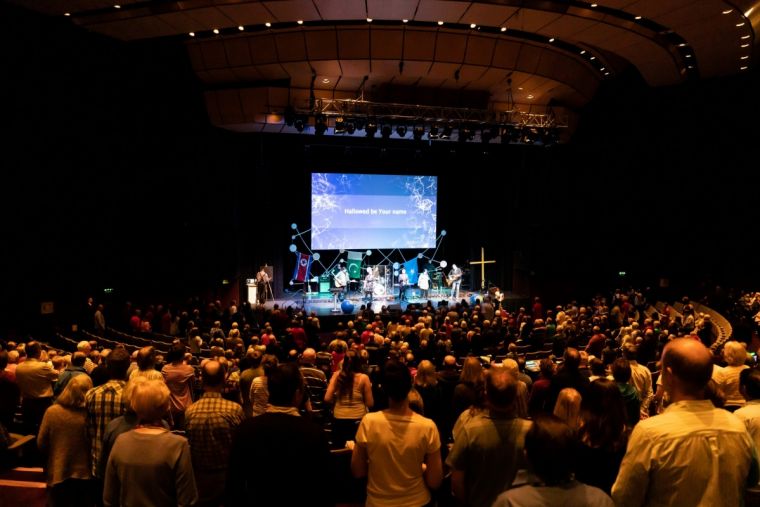Do Christian festivals have a future?

It's been a tough year. A year that none of us expected or planned for - and Christian festivals have been no exception. When Spring Harvest last gathered in the spring of 2019, we had no idea that it would be the last time we would meet physically for the next two years. It has had financial implications, along with many other practical challenges.
So, do Christian festivals have a future? It may sound like an ominous question, but we are not afraid of what the coming years will bring, we are excited. Rather than crumbling in the face of the restrictions and inability to meet in person, the past months have been a time of real innovation and generosity. We have seen God's creative image reflected so clearly in his people as new and exciting ways of gathering online have been developed.
Faced with a crisis, our eyes have been opened to new opportunities for fellowship; opportunities to break down barriers that may have held the gospel back, and to reach more people for Christ from a more diverse range of backgrounds and circumstances.
Hosting a festival online, in a way that will continue to be sustainable into the future, does pose unique challenges. We have a lot to learn, but we are up for the adventure. We want to provide a genuine opportunity to draw closer to God and create a space for everyone engaging with the content to encounter him; to create an environment where people learn more about him and what it means to be a disciple of Jesus, whilst having fun and connecting with others.
Achieving this is going to take serious thought and investment. Online gatherings can't be treated as convenient low maintenance additions; they really do take time, energy and resources.
Ultimately, we are still experimenting and discovering what the options are for delivering online content – teaching and worship are not too difficult to translate onto a screen but other things, particularly human interaction, take more thought. We are working on online exhibitions, pastoral and prayer appointments, interactive chat, networking opportunities as well as carefully considering the options for children and youth.
You might ask, 'Why is it worth it?' What does a hybrid format provide that a purely physical one can't? In the first instance, a hybrid format allows us to connect with people who are not physically present through tailored online content. The online gathering is brilliant for those who can't travel, for any number of reasons, and those who have less to spend on accessing worship and teaching events (the cost of the event, accommodation and travel all add up). You can also take part in events happening in other countries without having to travel internationally, and a single event has access to a far larger pool of contributors – we can hear testimonies from all over the world far more easily.
That said, I don't think physical gatherings will ever be completely replaced. We are social beings, made for interaction with each other, and worshipping God together can be a mountain-top experience like no other. God meets us alone in the silence, wherever we are, but I think he also loves it when we get together for a knees up. In Nehemiah 8 we see God's people gather to hear the book of the law being read and they weep together in shared sorrow, and then, on Nehemiah's instruction, 'All the people went away to eat and drink, to send portions of food and to celebrate with great joy, because they now understood the words that had been made known to them' (Nehemiah 8v12).
The gathering of believers is a biblical principle – throughout his lifetime, three times a year, Jesus would have travelled to Jerusalem for the 'pilgrim' festivals. There is power in gathering as the people of God to worship him, to hear from the Scriptures in a shared space, to discuss and debate and encourage each other. When we meet as a wider family, not just nuclear families, we find out what each other is going through and live through challenges together. We are fired up with the encounter, filled with the Holy Spirit and sent out afresh into our different communities.
But with time and creativity some of this can be achieved and expanded online. We have so much to learn from each other. We need a bigger picture of God's people. A rural parish in Lancashire has a different story to an urban one in Birmingham, or indeed a Christian in Iran. And now that we can meet online, that picture has got so much bigger!
Ultimately, we want to reach everyone with the good news of Jesus, and to draw them into the wider Christian family. Hanging out in the places where they want to be is key – whether that's a holiday resort or the digital space. Online and physical are both important because they can reach different people, meet different needs and help the Church reach further than we might have imagined.
So, as the country eases out of lockdown, one thing seems sure to me: hybrid is here to stay.
Abby Guinness is an actor/writer turned Head of Spring Harvest. Follow her on Twitter @abbyguinness. For more about this year's Spring Harvest, visit Spring Harvest Home 21.











